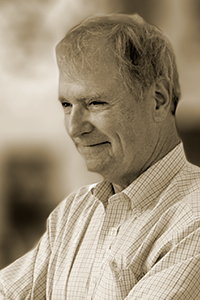Note: If you wish to receive, via e-mail, (1) my weekly newsletter or (2) daily copies of these posts, write to me at rrbates1951@gmail.com. Comments may also be sent to this address. I promise not to share your e-mail with anyone. To unsubscribe, write here as well.
Friday
For a few years now I’ve been in charge of our parish’s Adult Forum, a weekly series occurring between our two church services devoted to exploring some topic or theme. This year’s theme has been art and spirituality, to which we have given the name “Creating in God’s Image.”
I like this title, which echoes the line in Genesis that we are “created in God’s image,” because I often feel we are closest to God when we are engaging with art, whether creating it or consuming it.
Thus this past week’s presentation, when the noted poet Wyatt Prunty talked about “Faith and Imagination,” was particularly apropos. Prunty wasn’t specifically talking about religious faith—which is to say, he didn’t mention prayer or God or church—but that didn’t matter in the slightest. When he said that the poet has a faith in order and a conviction that the topic chosen is worth pursuing, he was gesturing towards a mystery that does not seem to be of this world.
Trying to explain how a poem comes about, he said that it sometimes feels like he is tapping into a melody which he must then follow. “It seems like there’s an inevitability to it,” he noted.
Prunty said this conviction doesn’t come from the classroom. Rather, it’s as though he is in a dark hall, and while he can’t see where he is going, he has faith that he has been there before and will find his way out.
Faith enables the imagination, he explained, while imagination justifies that faith, finding pre-existing connections that have been hitherto hidden from us.
Not that the process is easy or that poets are necessarily secure in their faith. Often, Prunty says, poets are a bit lost and wandering. Prunty’s image of being lost in a dark hall put him in mind of the Richard Wilbur poem “The Writer,” where the poet is hearing the intermittent typing and silences of his daughter working on a story. Wilbur is reminded of a bird trapped in a room:
I remember the dazed starling
Which was trapped in that very room, two years ago;
How we stole in, lifted a sashAnd retreated, not to affright it;
And how for a helpless hour, through the crack of the door,
We watched the sleek, wild, darkAnd iridescent creature
Batter against the brilliance, drop like a glove
To the hard floor, or the desk-top,And wait then, humped and bloody,
For the wits to try it again; and how our spirits
Rose when, suddenly sure,It lifted off from a chair-back,
Beating a smooth course for the right window
And clearing the sill of the world.
Another image of lost or wandering birds made its appearance later in the talk, with Prunty citing the final lines of Wallace Stevens’s “Sunday Morning.” The poem is about a woman meditating on nature, death, and beauty:
And, in the isolation of the sky,
At evening, casual flocks of pigeons make
Ambiguous undulations as they sink,
Downward to darkness, on extended wings.
So sometimes writers are thrashing around in an unfamiliar room, sometimes sinking downward to darkness.
As he looked at poets attempting to complete inner melody or find exit from hall or room, Prunty continued his focus on young people entering the unknown. In the Wilbur poem, the poet wishes the following for his story-writing daughter:
Young as she is, the stuff
Of her life is a great cargo, and some of it heavy:
I wish her a lucky passage.
Then, in a much darker poem, Prunty shared Ben Jonson’s elegy on the death of his seven-year-old son, whom he calls his “best piece of poetry” and whom he imagines escaping “the world’s and flesh’s rage.” He concluded with one of his own best-known poems, about helping his daughter learn how to ride a bicycle.
Learning the Bicycle
for Heather
The older children pedal past
Stable as little gyros, spinning hard
To supper, bath, and bed, until at last
We also quit, silent and tired
Beside the darkening yard where trees
Now shadow up instead of down.
Their predictable lengths can only tease
Her as, head lowered, she walks her bike alone
Somewhere between her wanting to ride
And her certainty she will always fall.
Tomorrow, though I will run behind,
Arms out to catch her, she’ll tilt then balance wide
Of my reach, till distance makes her small,
Smaller, beyond the place I stop and know
That to teach her I had to follow
And when she learned I had to let her go.
Just as a poet must have faith that his poems will discover where they are going, so a father must have that faith in his children.
Further thought: The line “beside the darkening yard” reminds me of William Blake’s account of children leaving their play as the sun descends in “The Echoing Green.” The poem concludes,
Till the little ones weary
No more can be merry
The sun does descend,
And our sports have an end:
Round the laps of their mothers,
Many sisters and brothers,
Like birds in their nest,
Are ready for rest;
And sport no more seen,
On the darkening Green.
While the poem, appearing in Songs of Innocence, appears to be happy, the “darkening” foreshadows Songs of Experience. Heather Prunty too will be leaving her innocent childhood behind.


